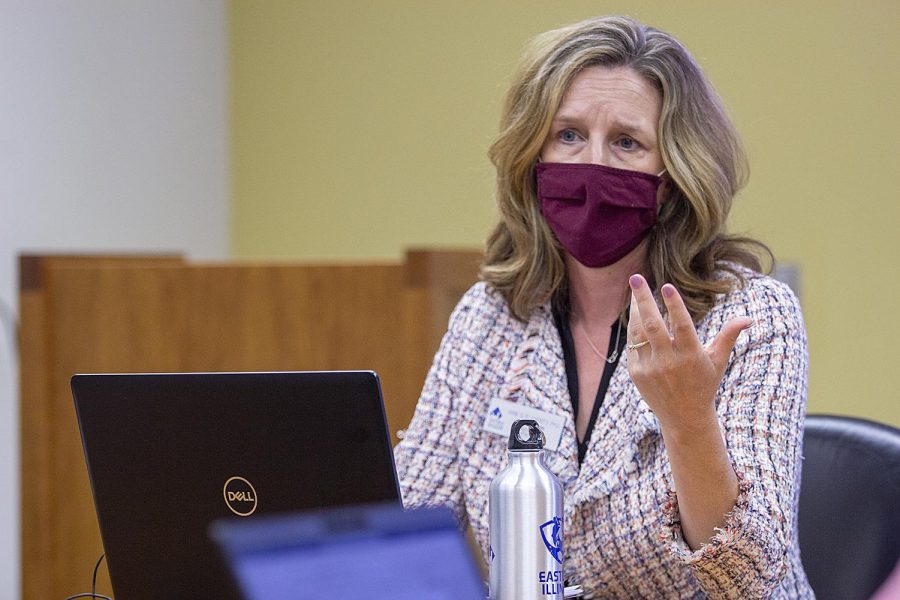Admins say funding limits mental health resources for Eastern students
Vice President of Student Affairs Anne Flaherty gives a presentation on the current status of student mental health and the measures the department has done to assist students at the Sept. 29, 2021 Faculty Senate meeting.
April 13, 2022
Eastern’s university president and vice president of student affairs said administration is striving for more mental health resources for students, but is struggling to obtain the funding needed.
“Student mental health needs have been rising at universities across the country and EIU is no exception,” Eastern University President David Glassman said. “We are working diligently to meeting the health needs of our students and increasing the numbers of mental health counselors we have on campus as well as several other activities to promote positive mental health.”
In August 2019, Illinois passed the Mental Health Early Action on Campus Act in order to address mental health gaps in higher education in Illinois; through this act, an 11-goal system would be in place in colleges and universities.
These goals aim to imbue mental health services, training and awareness, screening tools, peer groups and the formulation of strategic partnerships with local mental health services on college campuses.
This training would ensure non-counseling staff are properly trained to identify and respond to a student with a mental health concern.
Vice President of Student Affairs Anne Flaherty said the administration wants to implement these plans at Eastern, but don’t have the funds to do so currently.
After two years, the legislation remains unfunded, leaving the bill dormant.
On Jan. 31, the Mental Health Early Action on Campus Appropriations Act received its first reading in the Illinois General Assembly, amending the previous bill.
The new bill will appropriate $19 million in the fiscal year 2023 in support of improving the mental health of students in higher education.
As of April 7, the bill was referred to the Rules Committee of the Illinois General Assembly where it will be examined, and its chances of passing through the entire Congress are determined.
This semester, Eastern started to make plans for if this bill makes it through Congress.
The Mental Health & Well-Being Review group at Eastern have been meeting since January every week to discuss the 11 goals and how to implement them on campus.
The group will present their results at the next Board of Trustees meeting on April 22, to show what could happen if Eastern had the resources to implement these goals.
Flaherty said in her time at Eastern there has always been a waitlist for the counseling center.
In hopes to reduce the waitlist size, the counseling center hopes to gain new counselors, according to Flaherty.
The new positions will include an associate director, who will spend half their time as director and the other directly counseling students, and a new counselor.
LifeLinks, a service in Mattoon, Ill., has a partnership with Eastern to offer resources to students on and off campus, at their facilities.
The non-profit group aims to assist people whose mental health has been negatively affected by COVID-19 pandemic.
After this semester, Flaherty is uncertain if LifeLinks will continue to receive federal funding through the CARES Act to help aid Eastern students.
If the funding goes away, Flaherty says she hopes the new counseling additions can help fill the gap left.
An email sent April 4, informed faculty of the services on campus to support students and fellow faculty during the final five weeks before the end of the semester.
Included in this email is an online referral form submittable to the Student Support Team, who specializes in providing assessment, counseling and referrals to students displaying concerning or distressed behavior.
Also included is a “Distressed Student Handbook” providing staff guidance on how to respond in specific scenarios.
Flaherty said administration knows students need help, but students are not utilizing all the resources available to them.
Flaherty referenced Eastern events like the therapy dogs in Booth Library, mental health pop-up events and other events as resources students do not utilize.
Robert Le Cates can be reached at 581-2812 or at [email protected].




















































